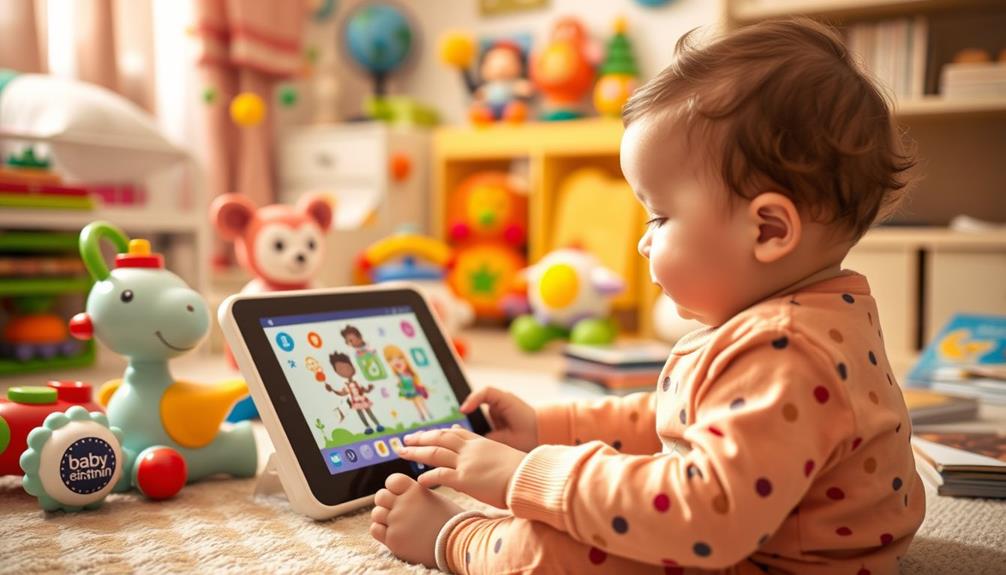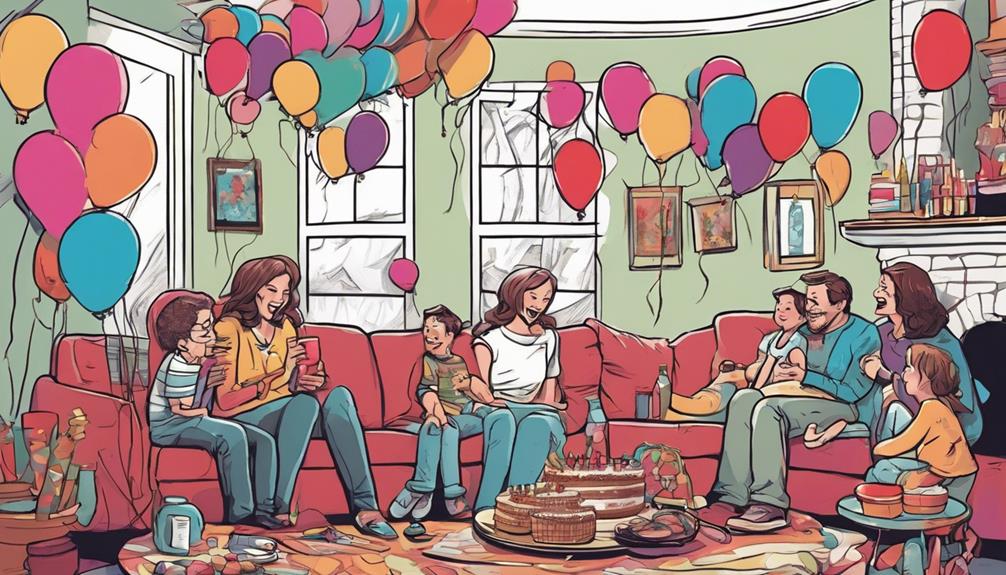Baby Einstein's impact on early childhood education has drawn mixed opinions from experts. While it became a household name, promoting early language engagement through music and visuals, concerns soon arose. Studies suggested that infants watching these videos actually learned fewer words compared to their peers. Experts recommend prioritizing real-life interactions over passive viewing, as face-to-face engagement improves vocabulary skills considerably. With evolving guidelines urging limited screen time for children, the dialogue around educational media continues. If you keep exploring, you'll discover more about how Baby Einstein has shaped modern parenting and its ongoing legacy in educational practices.
Key Takeaways
- Expert research indicates that infants watching Baby Einstein learn fewer words compared to those who engage in active, human interactions.
- The American Academy of Pediatrics advises against screen time for children under 18 months, emphasizing the importance of interactive communication.
- Studies show that face-to-face interactions significantly enhance vocabulary skills, surpassing the benefits of passive video consumption.
- The shift from video content to interactive toys reflects a growing consensus on the value of hands-on experiences in early childhood education.
- Experts recommend limiting screen time and prioritizing daily reading and interactive activities to foster better language development in young children.
Origins of Baby Einstein
In the world of early childhood education, Baby Einstein emerged as a groundbreaking concept in 1996, thanks to Julie Aigner-Clark, a stay-at-home mom with a vision.
With a borrowed camcorder and an $18,000 budget, she crafted the first video in her basement, aiming to create educational entertainment for infants as young as six months old. This innovative blend of visuals, music, and poetry captured the attention of young viewers, making learning enjoyable from the start.
By fostering a creative environment at home, parents can enhance their children's learning experiences, reflecting the importance of integrating technology into family learning.
Julie's approach was innovative; she recognized that early exposure to rich sensory experiences could stimulate a child's development.
By 2002, Baby Einstein videos gained widespread popularity, with studies revealing that one-third of American babies aged six months to two years had watched at least one video. This success marked a significant shift in early childhood education, emphasizing the importance of engaging content for infants.
The acclaim for Baby Einstein reached impressive heights, with appearances on platforms like the Oprah Winfrey Show and even praise from President Bush in a State of the Union address.
Julie Aigner-Clark's vision not only transformed educational entertainment but also laid the foundation for a new era in early childhood learning.
Popularity and Cultural Impact

By 2002, Baby Einstein had skyrocketed in popularity, becoming a fixture in many homes with one-third of American infants watching its videos.
This cultural shift in parenting not only showcased the influence of media on families but also sparked conversations about screen time and child development.
As parents navigated this new landscape, they began to reflect on the importance of a balanced approach to education that included mindful eating practices and overall well-being.
As you explore Baby Einstein's rise and its lasting impact, you'll see how it shaped the way parents approach early education.
Rise of Baby Einstein
From its inception in 1996, Baby Einstein quickly transformed into a cultural phenomenon, enchanting parents and children alike. By 2002, it became a household staple, with one-third of American babies aged 6 months to 2 years having watched at least one video. The engaging themes, like Baby Mozart and Baby Galileo, combined classical music with enthralling visuals, promoting language development during those critical early years.
The brand's success caught the attention of Disney, which acquired Baby Einstein in 2001 for around $25 million, amplifying its reach. Notable figures, including President Bush and Oprah Winfrey, praised the videos, enhancing their cultural impact. However, as screen time became a growing concern, research began to question the educational value of these videos. This shift ultimately led to a decline in Baby Einstein's reputation, prompting the company to drop "educational" from its marketing.
Here's a quick overview of Baby Einstein's rise:
| Year | Event | Impact |
|---|---|---|
| 1996 | Founded | Launched a new genre |
| 2001 | Sold to Disney | Expanded marketing and reach |
| 2002 | Gained household popularity | One-third of babies watched |
Cultural Shift in Parenting
During the early 2000s, Baby Einstein videos reshaped parenting norms, as many parents embraced the idea of using media to engage their infants. By 2002, one-third of American babies aged 6 months to 2 years had watched at least one Baby Einstein video, reflecting a significant shift in parenting practices.
You might've noticed how families relied on these videos for quiet time, with some children watching them up to ten times a day, indicating a growing dependence on screen time for distraction.
However, as the years progressed, concerns emerged regarding the educational value of Baby Einstein. Advocacy groups began challenging the effectiveness of such media, prompting many parents to reconsider their reliance on screens and seek more interactive forms of engagement.
This cultural shift emphasized the importance of human interaction in child development, leading to revised guidelines from experts.
Ultimately, the legacy of Baby Einstein highlights ongoing debates surrounding technology's role in parenting. As you navigate your own parenting journey, it's crucial to weigh the potential benefits and drawbacks of screen time against the need for active, hands-on involvement in your child's learning and growth.
Media Influence on Families
The popularity of Baby Einstein videos not only changed how parents interacted with their children but also reshaped broader family dynamics. By the early 2000s, one-third of American babies aged 6 months to 2 years had watched these videos, cementing their place in family media consumption. Initially praised by public figures and featured on platforms like Oprah, these videos became synonymous with early childhood education.
| Year | Viewership (%) | Criticism Highlighted |
|---|---|---|
| 1996 | 0% | Launch of Baby Einstein |
| 2002 | 33% | Cultural phenomenon |
| 2005 | 50% | Used for quiet time |
| 2010 | 10% | Concerns from American Academy of Pediatrics |
Despite their initial success, research showed that excessive screen time could hinder language development, leading to a sharp decline in the videos' popularity. The American Academy of Pediatrics advised against relying on media for education, emphasizing interactive play instead. While Baby Einstein has shifted focus to toys, the media influence of its videos still lingers, reminding families to critically assess their choices in early childhood education.
Criticism and Educational Concerns

Critics have raised significant concerns about the impact of Baby Einstein videos on early childhood education. Research shows that infants aged 8-16 months who regularly watch these videos know 6-8 fewer words per hour compared to non-viewers. This alarming statistic highlights a troubling connection between passive video consumption and delays in language development.
The criticism intensified when a class-action lawsuit accused Baby Einstein of making misleading claims about the educational value of its content, leading to the removal of the term "educational" from their marketing materials. Additionally, experts emphasize the importance of understanding divorce in relation to emotional well-being, which can also be relevant for parents maneuvering the challenges of child development during changes.
Studies from the mid-2000s revealed that babies exposed to Baby Einstein videos tended to score lower on language skills than their peers. The American Academy of Pediatrics recommends no screen time for children under two, emphasizing the importance of interactive, face-to-face communication over passive video viewing.
Experts argue that the passive nature of these baby videos may hinder language learning, advocating for more engaging interactions with caregivers instead. Ultimately, the overwhelming evidence suggests that relying on Baby Einstein videos for educational benefits can do more harm than good, raising critical questions about their role in early childhood development.
Changing Guidelines on Screen Time

As concerns about the impact of passive video consumption on language development have grown, guidelines on screen time for young children have evolved considerably. The American Academy of Pediatrics now advises no screen time for children under 18 months, prioritizing human interaction over passive viewing. Early guidelines from 1999 permitted some screen time, but increased research has spotlighted the risks linked to excessive screen exposure in early childhood.
| Age Group | Previous Guidelines | Current Recommendations |
|---|---|---|
| Under 18 months | Limited screen time allowed | No screen time, except for video calls with parents |
| 18 to 24 months | Moderate viewing encouraged | Selective viewing with parental guidance |
| 2 to 5 years | Up to 1 hour daily | Max 1 hour of high-quality programming, with interaction |
Experts now emphasize balancing screen time with active engagement and real-world experiences. By fostering interactions during video calls, you can enhance your child's social skills and language development. Ultimately, it's essential to remain mindful of your child's screen exposure to support healthy child development.
Legacy of Baby Einstein

Baby Einstein's legacy is significant in shaping both educational approaches and parenting practices. The emphasis on interactive, hands-on experiences aligns with trends in early childhood education that prioritize active engagement, much like the influence of celestial bodies on personality traits.
As you consider its impact, think about how the brand's evolution reflects a broader shift toward prioritizing interactive, hands-on experiences over passive viewing. This transformation raises important questions about the role technology should play in early childhood development.
Historical Significance in Education
The legacy of Baby Einstein has left a lasting imprint on early childhood education, transforming how parents perceive educational entertainment for infants. Founded in 1996 by Julie Aigner-Clark, Baby Einstein quickly became a household name by 2002, enchanting millions with its engaging videos. The brand's creative themes, like Baby Mozart and Baby Galileo, blended visuals, music, and poetry to provide parents with options for distraction while aiming to enhance their child's educational value.
However, as research emerged in the mid-2000s questioning the educational value of these videos, concerns arose about the potential negative impact on language development. Critics argued that excessive viewing could delay language skills in infants, prompting a reevaluation of Baby Einstein's role in early childhood education.
The backlash culminated in a class-action lawsuit against Disney, which had acquired Baby Einstein in 2001. Responding to the public outcry, Disney offered refunds estimated at $100 million, marking a significant shift in how Baby Einstein is viewed in the educational landscape.
Ultimately, the brand's journey illustrates the complexities of educational media for young children and underscores the importance of research in shaping parenting practices.
Shift in Parenting Practices
A significant shift in parenting practices has emerged in the wake of Baby Einstein's popularity, prompting many to rethink how they engage with their infants. Initially, parents believed that video viewing would enhance their children's cognitive skills, but research has shown that excessive screen time can actually hinder language development. This realization has led to a more critical approach to media consumption in early childhood.
The American Academy of Pediatrics has advised against screen time for children under two, encouraging parents to prioritize interactive engagement over passive viewing. As you navigate this new landscape, you might find yourself seeking activities that foster direct interaction and communication with your child. Many parents have turned to reading, storytelling, and hands-on play as primary methods for promoting healthy language and cognitive skills.
This legacy of Baby Einstein has sparked broader conversations about effective parenting strategies, urging families to focus on quality interactions that support healthy growth.
Current Brand Evolution
In recent years, Baby Einstein has shifted its focus from video content to developing toys and non-digital products that promote interactive play and learning. After being sold to Disney in 2001, the brand became a household name, with one-third of American babies aged 6 months to 2 years having watched at least one of its educational videos by 2002.
However, following critiques about the real educational benefits of these videos, Baby Einstein recognized the increasing concerns surrounding screen time and language development. As a result, the brand dropped the term "educational" from its marketing, acknowledging the need for hands-on experiences over passive viewing.
This evolution reflects a broader understanding of child development, emphasizing the importance of human interaction and active engagement. While video popularity has declined due to research showing negative impacts on language acquisition, Baby Einstein continues to adapt to modern parenting needs.
Language Development and Video Viewing

Research shows that infants aged 8-16 months who watch Baby Einstein videos learn 6-8 fewer words per hour than their peers who don't engage with such content. This alarming statistic highlights the negative impact of passive screen time on language development.
Babies typically start to acquire language skills around 18-24 months, and studies indicate that exposure to educational videos like Baby Einstein can delay this significant process. In fact, babies who watch these videos scored 10% lower on language skills compared to those who didn't.
Additionally, as with dog training and socialization, interactive experiences are essential for developing essential skills.
The American Academy of Pediatrics emphasizes the importance of face-to-face interaction for effective language education, recommending no screen time for children under two years old. They argue that real-life engagement is far more beneficial for developing communication skills than passive viewing.
Despite marketing claims suggesting cognitive benefits from baby videos, research consistently finds no significant advantages. Instead, relying on such products for language skill enhancement may hinder your baby's development.
As a parent, it's crucial to focus on interactive experiences and conversations, as these foster a richer language environment for your child's growth.
Expert Recommendations for Parents

Steering through the landscape of early childhood education can be overwhelming for parents, especially with the myriad of options available. To guarantee the best language development for your children, experts offer some vital recommendations.
| Recommendation | Explanation |
|---|---|
| Limit screen time | Children under 18 months should avoid passive video content. |
| Prioritize face-to-face interaction | Engaging in conversations boosts vocabulary and understanding. |
| Read daily | Storytelling is linked to improved language skills for children. |
| Verify educational content | Many marketed videos lack real cognitive benefits. |
| Engage actively | Back-and-forth dialogues enhance language acquisition. |
Importance of Interactive Engagement

Interactive engagement plays an essential role in your child's language development. Engaging directly with your child through face-to-face interactions is far more effective than passive video watching. Research shows that infants who participate in back-and-forth communication with adults develop vocabulary skills considerably better than those who primarily watch educational videos.
Additionally, incorporating various play types can further enhance cognitive and social skills, enriching the overall learning experience for your child.
To enhance your child's cognitive growth, consider these three strategies:
- Limit Screen Time: The American Academy of Pediatrics suggests reducing screen exposure for children under two, stressing the importance of human interaction over passive viewing.
- Encourage Daily Interactions: Simple activities like talking, reading, and singing with your child provide critical stimulation for healthy brain development.
- Promote Active Learning: Instead of relying on screens, engage in interactive play that fosters curiosity and language skills.
Passive screen time can lead to delayed language acquisition, with studies indicating infants know 6-8 fewer words per hour of video watched.
Prioritizing interactive engagement not only supports language development but also builds a stronger emotional connection with your child, setting the foundation for lifelong learning.
Frequently Asked Questions
Is Baby Einstein Effective?
You might be wondering if Baby Einstein is effective. Research shows that watching these videos can actually hinder language development in infants.
Studies indicate that kids aged 8-16 months who watch Baby Einstein know fewer vocabulary words compared to non-viewers. The American Academy of Pediatrics recommends avoiding screen time for children under two, emphasizing the importance of interactive learning with caregivers.
Given this evidence, it's wise to reconsider the effectiveness of Baby Einstein.
Why Is Little Einsteins Good for Kids?
When you think of "Little Einsteins," imagine a delightful adventure where your child dances through a world of music and art.
This show's engaging format sparks curiosity and promotes active participation, helping kids develop essential cognitive skills.
By immersing themselves in tales and tunes, they're not just entertained—they're learning to communicate and connect with others.
It's a wonderful way for your little one to explore culture while nurturing their growing minds and hearts.
Is Baby Einstein Overstimulating?
Yes, Baby Einstein can be overstimulating for infants.
With rapid scene changes and bright visuals, it captures attention but may lead to shorter attention spans.
When you let your child watch these videos frequently, it might disrupt their natural developmental processes, particularly language acquisition.
Instead of engaging in passive viewing, you should focus on providing social interaction and nurturing activities, as these are essential for healthy cognitive and emotional development.
Is Baby Einstein a Good Brand?
When considering if Baby Einstein is a good brand, it's important to look at what they offer today.
While their earlier videos faced criticism for potentially hindering language development, they've shifted focus to toys and non-digital products that promote active play.
If you value hands-on interaction for your child's learning, you might find their current offerings more aligned with effective early childhood education.
Always prioritize products that encourage engagement and connection over passive viewing.
Conclusion
In the end, Baby Einstein's blend of bright visuals and catchy concepts can spark curiosity, but it's essential to remember that meaningful moments matter most. Prioritize playful participation over passive viewing, and foster fruitful interactions to fuel your child's learning journey. Embrace the balance between screen time and shared experiences, ensuring your little one thrives through thoughtful engagement. By nurturing their natural curiosity, you'll help them access a world of wonder and wisdom.










